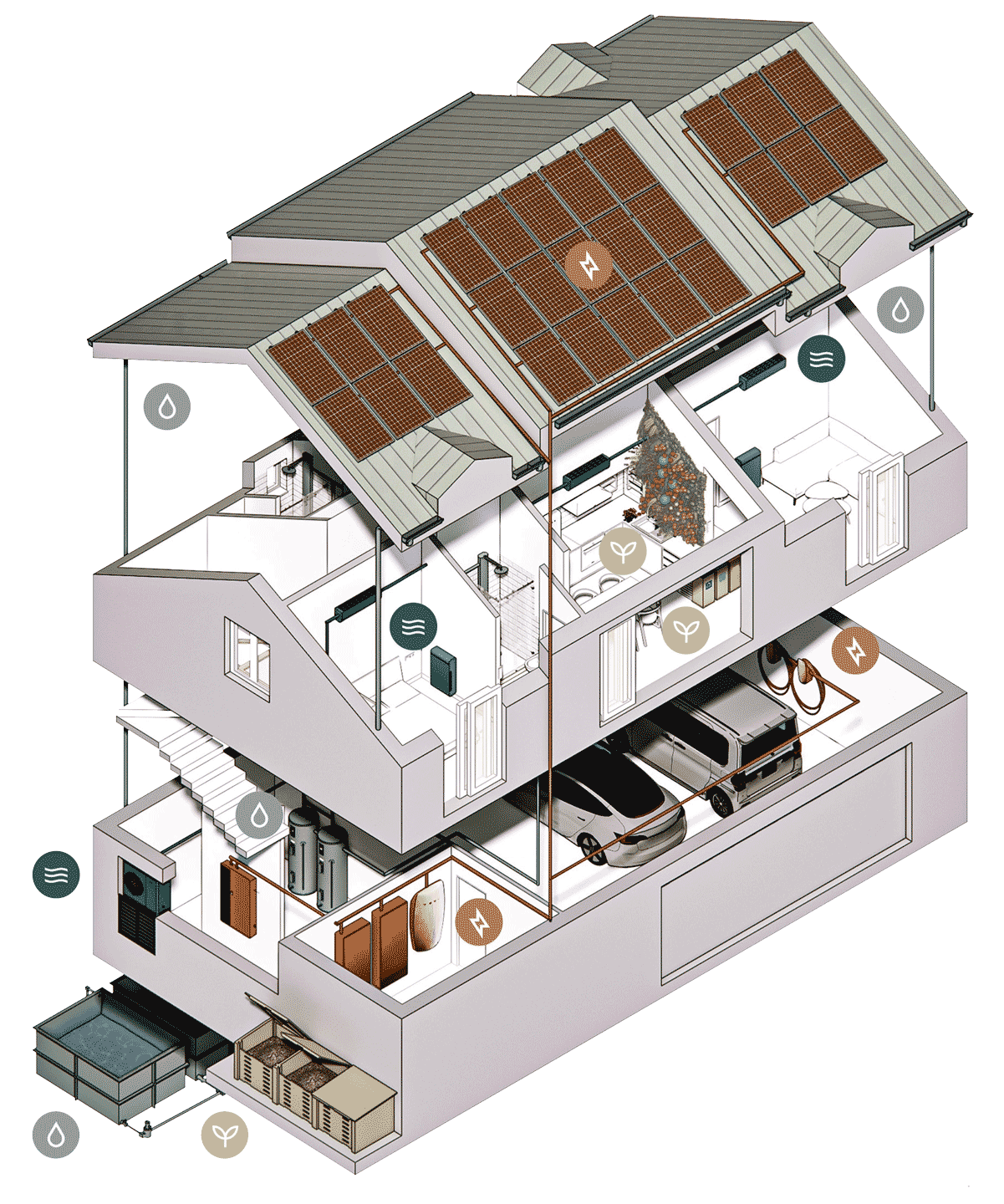
Revive Your Home With
Food Solutions
Grow Walls, Food Waste Management, and more..
Start your generative living journey today
96
INCREASE IN NUTRIENT DENSITY BY GROWING FOOD AT HOME
12
REDUCTION IN PESTICIDE USE BY FAMILY BY GROWING FOOD AT HOME
6.5
OF OXYGEN PRODUCED BY GROWING FOOD AT HOME
Our Technology
GROW WALLS
- Residential grow walls allow for vertical gardening, enabling homeowners to grow fresh herbs, vegetables, and other plants in limited spaces, maximizing the use of available light and reducing the need for traditional garden plots.
- Grow walls are most effective when integrated with efficient irrigation systems and LED grow lights, which provide optimal growing conditions and ensure consistent food production throughout the year.
- Although grow walls are not specifically covered by the Inflation Reduction Act (IRA), homeowners may be eligible for other sustainability incentives or rebates that encourage urban gardening and self-sufficient food production practices.
FOOD WASTE MANAGEMENT
- Food waste management systems help reduce the amount of organic waste sent to landfills by turning food scraps into valuable compost that can be used to enrich garden soil.
- Residential composting is most effective when combined with other sustainable practices, such as using compost in home gardens or landscaping, reducing the need for chemical fertilizers, and supporting soil health.
- Some local governments offer rebates or incentives for residential composting systems, encouraging homeowners to adopt environmentally friendly waste management practices that reduce their carbon footprint and promote sustainability.
GARDEN PLANNING
- Residential food gardens produce fresh vegetables and herbs, and careful planning ensures optimal sunlight exposure and soil conditions for healthy plant growth, even in small spaces.
- Food gardens are most productive when combined with sustainable practices, such as using rainwater harvesting systems and composting, which conserve resources and enrich the soil for higher yields.
- While food garden installations aren’t directly covered by the Inflation Reduction Act (IRA), local programs and incentives may be available to support urban agriculture and sustainable food production, helping homeowners reduce their grocery bills and carbon footprint.
SEEDS AND NUTRIENTS
- High-quality seeds are essential for successful home gardening, and sourcing from reputable suppliers ensures that plants are more resistant to pests and diseases, leading to healthier and more productive yields.
- Combining organic fertilizers and nutrient-rich compost with quality seeds enhances soil fertility and plant growth, providing the essential nutrients needed for robust home food production.
- While seed and nutrient sourcing aren’t directly covered by the Inflation Reduction Act (IRA), some local agricultural extension programs offer discounts or incentives to encourage sustainable gardening practices and support local food systems.
LOCAL FOOD SOURCING
- Local food sourcing supports nearby farmers and reduces the environmental impact of transportation, ensuring that food travels shorter distances and results in lower greenhouse gas emissions.
- Fresh produce from local sources is often more nutritious and flavorful, as it can be harvested at peak ripeness and delivered quickly, unlike food that travels long distances and requires preservatives.
- Many communities offer programs and incentives to encourage local food sourcing, including farmers’ markets and community-supported agriculture (CSA) initiatives, which help strengthen the local economy and promote sustainable food systems.
WE HELP MAXIMIZE
Financial Incentives and Rebates
Navigating the many tax credits and rebates is no small task. Our team specializes in helping you understand what incentives are available, and can guide you through the process to receive these financial benefits. We want everyone to have access to a generative lifestyle, and know that money savings help make this a reality.
Economical + Environmental
Helping You is Our Priority
Tell us what you’re interested in
Schedule A Free Consultation Call

Generative Systems for Your Entire Home
We Offer More Than Just Food Solutions
At issho, we have reimagined how energy, water, food, and air systems function in your home. We’ve create integrated solutions that harmonize these elements to foster a nurturing environment. By enhancing the way these different systems interact, we empower you to live sustainably and healthfully, every day.
Featured News







